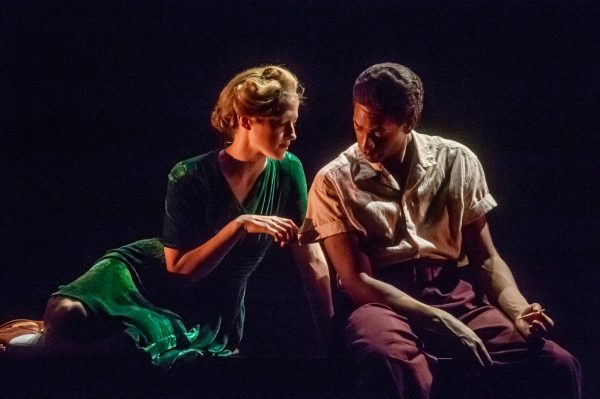Theater Review: “Detroit Red” — Life in Boston, At the Bottom
By Robert Israel
While there is much to admire about Detroit Red’s script, there are serious problems with the staging.
Detroit Red, by Will Power. Directed by Lee Sunday Evans. Staged by Arts Emerson at the Emerson Paramount Center, 559 Washington St., Boston, MA, through February 16.

Brontë England-Nelson and Eric Berryman in Detroit Red at Arts Emerson. Photo: Randall Garnick Photography.
Playwright Will Power listens well. The speeches he has crafted in his one-act play intertwine music and pain. The distinctive patter has been shaped for a young man named Detroit Red (Eric Berryman), newly arrived to Roxbury, Massachusetts, circa 1940s. Detroit Red has a troubled backstory: his father, a preacher and political activist, was murdered by white supremacists, his mother committed to an asylum. Living with his half-sister Ella as the play opens, he’s learning a new vocabulary from his musician friend Shorty (Edwin Lee Gibson). He’s also wandering the streets of Boston, wide-eyed and troubled.
Born Malcolm Little in Omaha, Nebraska, he acquired the street name Detroit Red in part because of the Red Devil Lye we see him use to conk his hair for the sake of a reddish tint. Also, his friends knew he had family back in Lansing, but the only city in Michigan they identified with was Detroit. He would later be called Big Red, Satan, and Homeboy. When he converted to Islam, he was given the name Malcolm X. At the time of his assassination at age 39 in 1965, he had taken on the name El-Hajj Malik El-Shabazz.
The play draws on biographical scenes from Malcolm X’s Roxbury years, sourced from The Autobiography of Malcolm X, Alex Haley’s book published after Malcolm’s death. In that book, Malcolm recalls his days in the Boston area and tells Haley, “I haven’t [told my story] to sound as though I might be proud, or how evil I was…[my intention is not to] titillate readers…[but to tell them] I had sunk to the very bottom of the American white man’s society.”
Powers remains true to Malcolm X’s wishes, especially in a scene that shows a naked Detroit Red catering to the twisted sexual appetite of a white man (Brontë England-Nelson, who plays several roles, including Detroit Red’s girlfriend). The scene has not been included for prurient reasons, but to show the depths of depravity of Detroit Red’s world.
That world included alcohol and drug abuse; breaking, entering, and fencing stolen goods; and the racial taboo of living with a white girlfriend (who later assists him in his capers and plies him with money given to her from her white fiancé). At this point, that aforementioned musical patter has become infused with new rhythms—persuasion laced with anger. During his Roxbury years Malcolm X learned valuable lessons in leadership—through his experience as the mastermind for a gang of thieves. In his Autobiography (an episode not included in the play), he describes playing Russian roulette to convince his fellow crooks that he should be the kingpin.
While there is much to admire about Detroit Red’s script, there are serious problems with the staging. The Paramount’s main stage is vast. Even though the performers are equipped with microphones, their voices are often lost in space. Director Lee Sunday Evans would be advised, from the start, to bring the production closer to the edge of the stage, to make the proceedings up front and in our faces (which she does in later scenes). The early scenes between Shorty and Detroit Red that take place in his bedroom are lost. For maximum impact, the action needs to be more immediate. The awkward distance that afflicts the staging is extenuated by Alan Edwards’s lighting design: it is dim, to the point that audience members find themselves squinting to see what is taking place in the unnecessarily murky shadows.
On the other hand, the production should be lauded for the inclusion of a short black-and-white film clip that takes us onto the mean streets and then into a seedy jewelry store in which Detroit Red confronts a Boston detective. Ironically, the powerful effect of hearing Detroit Red’s labored breathing as he holds a pistol underscores the need to bring more theatrical immediacy to the other scenes.
The life of Malcolm X will no doubt inspire other stage works. This play, which explores his germinal early years in Boston, is a promising first step.
Robert Israel writes about theater, travel and the arts, and is a former member of the Independent Reviewers of New England (IRNE).
